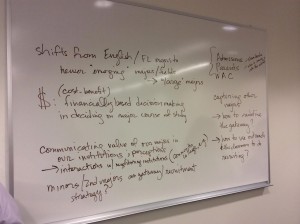Recommendation letter season is upon us, and I’ve been asked to write for a graduate student whom I’ve occasionally worked with but do not supervise. In getting an update on her work, I’ve found that she’s not making very much progress, and she seems to be continually headed down rabbit holes in her writing that aren’t materially advancing her work. Some of the blame here is hers, but some of it also rests with her director, a man who likes talking about big ideas (including some rabbit holes) but also seems aloof and disconnected from the direct, more focused contact the student needs in order to finish. How can I—or should I—intervene here?—Trying to Help Alice in Blunderland
Dear Trying,
You need to intervene, and fast. You didn’t mention what kind of recommendation the student’s asking for, but I hope for both your sakes that it’s not for job applications, since she’s obviously not ready. I’m also assuming that you’re on her committee, which is why she’s asking you for a letter. But there’s no doubt she’s floundering and she needs help.
Is this behavior towards advisees typical of this faculty member? If so, you definitely need to talk to him. This student isn’t well-suited to this adviser and would benefit from someone who’s more process-oriented, but this is the guy she chose and it’s his responsibility to recognize her problems in buckling down.
As with all tough conversations, it’s best to get to the point. Send him an email, or when you run into him in the hallway say “We should talk about Student X.” Once you’re sitting down and you’ve got the small talk out of the way, just dive in: “I’m worried about Student X’s progress. She’s Y years into the dissertation process and she’s only got Z written.” He might share your concerns, which makes this conversation much easier. From what you’ve said, though, it’s more likely that he’ll
a) Talk about how brilliant she is and/or
b) Say her project needs more theorizing and/or
c) Expound on the new directions she needs to take.
This is when you need to put on your chair hat. Yes, this student is very bright and capable, and has a lot of promise, and the dissertation probably needs more theoretical scaffolding. But what’s true for students — the best dissertation is a finished dissertation — is equally true for advisers. She doesn’t have the luxury of time that your (senior?) colleague does in working through all the angles of her project. She needs to get out of grad school and into the world.
Set a tentative defense date with him and then work backwards.What does she need to do to finish by, say, Fall 2018 (assuming that’s a reasonable goal)? Her adviser has to be on board with moving her forwards and thinking of what she needs to get done. Emphasize to him that he isn’t doing her any favors by extending the process.
Next you should talk to her again. Let her know that her adviser is committed to helping her finish and that she needs a realistic and meaningful timetable. Encourage her to join a writing group, to set and keep to cumulative goals, and focus on those goals. Some people find web resources like Pomodoro helpful; there are also a few books about finishing a dissertation. She also needs a very polished chapter for a writing sample — can she and her adviser decide which that should be and concentrate some energy on it?
This might also be a good time for a department-wide conversation about what makes a good dissertation adviser. How do you balance encouraging the student’s curiosity with keeping in mind the fact that the dissertation is a means to an end as much as, or more than, an end in itself? If you can have a productive discussion among yourselves, all your students will benefit.
The Chair


